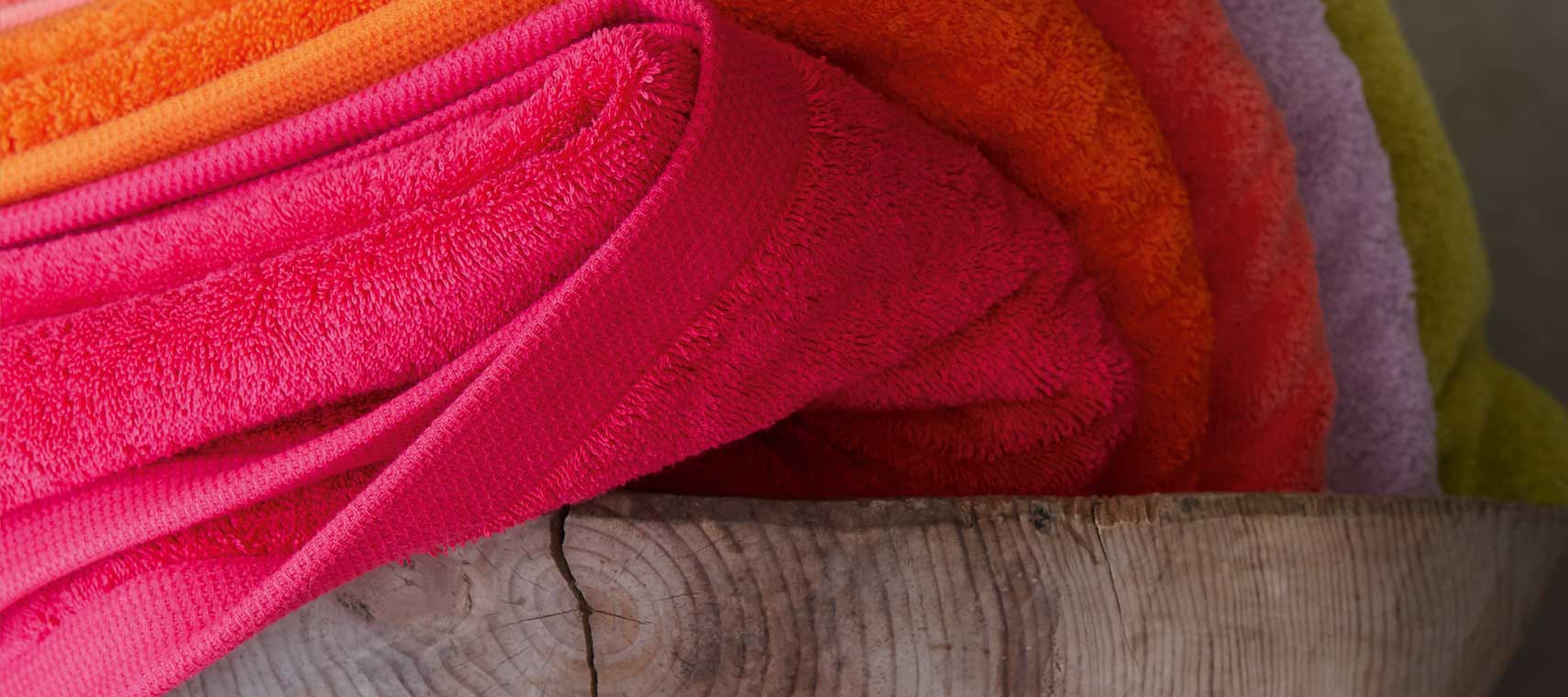Weights of towelling
The weight of a towel is measured in gsm, which means grams per square metre. This relates to the weight of the fabric (usually cotton) woven into a square metre of towelling. It's easy to assume that the heavier the towel, the more absorbent it is. But you need to consider the type of cotton used as well.
Heavyweight towels - 700-900gsm
Heavyweight towels feel warm and substantial when wrapped around your body. They are generally long lasting.
Medium weight towels - 400-600gsm
Medium weight towels are just as absorbent as heavyweight towels, but are lighter, cooler and faster drying. This makes them ideal for families as they're easier for children to manage and quicker to dry in busy bathrooms.
Lightweight towels - 150-350gsm
Lightweight towels are super versatile, quick to launder and easy to pack. Often made with no pile, they're woven from thicker cotton, providing the extra surface area they need to be absorbent. Lightweight hand towels work well in cloakrooms and kitchens, or you might pack a lightweight bath towel or sheet for the gym or beach. Aside from cotton, towelling can be made of linen, bamboo, hemp or even wood fibre.
Types of cotton towelling
Cotton is a soft, fluffy fibre that's naturally breathable and absorbent as it allows air and water to pass through the yarns. It's the most commonly used fibre for making towels and towelling robes.
Egyptian cotton
Egyptian cotton is recognised as one of the best quality cottons in the world, known for its strength, durability and lovely fluffy feel. Egyptian cotton towels are really soft, warm and absorbent. They're made with a deep terry towelling pile formed of twisted yarn 'loops'. These absorb water not only through the yarns themselves but also by trapping water in the loops.
Hydrocotton
Made from pure natural cotton, this special towelling uses a clever technology where the yarn is spun with little to no twist and an airy hollow core. This makes the towelling feel just as thick and soft as Egyptian cotton while being beautifully lightweight, incredibly absorbent and very fast drying.
Aerocotton
Made from ultra long staple Aegean Turkish cotton, this super soft and lightweight towelling uses an innovative spinning technique that gives the yarns a special twist and creates air channels around the fibres. This allows air to pass through, making the towelling highly absorbent and fast drying. Despite its widespread use in casual fabrics and clothing today,
the word 'cotton' comes from the Arabic 'qutun' meaning 'fancy fabric'.
What size towel do I need?
Towels
| Size | Centimetres |
|---|---|
| Face Cloth | 30 x 30 |
| Bath Towel | 50 x 90 |
| Hand Towel | 70 x 125 |
| Bath Sheet | 100 x 150 |
| Jumbo Sheet | 115 x 180 |
Bath mats
| Size | Centimetres |
|---|---|
| Square | 60 x 60 |
| Medium | 50 x 80 |
| Large | 70 x 110 |
| Extra Large | 100 x 150 |
| Runner | 50 x 150 |
- Double up your hand towel to wrap around dripping wet hair
- A bath towel is a good size for children and guest bathrooms
- A bath sheet is bigger than a bath towel and smaller than a jumbo sheet
- A bath runner is ideal if you're bathing children - plenty of room for four or more soggy feet
- A face cloth is easy to pack and works well when you need a quick body wash
- A jumbo sheet is pure decadence - a super generous wrap for everyday indulgence
Caring for your towels and bathmats
Always wash your new towels before you use them to 'break them in'. It takes several washes for towels to achieve their maximum absorbency, softness and fluffiness.
To help keep your coloured towels looking lovely and bright, use a special 'colour' washing powder. Also keep them away from strong sunlight as well as bleaches, oils and face creams that contain benzoyl peroxide. To keep your white towels brilliantly white, only ever wash them in a 'white' load.
Avoid using fabric conditioner with towels, as it leaves a 'coat' on the towelling loops, which reduces their absorbency. If you do use fabric conditioner, use only the tiniest amount in only the occasional wash.
Tumble dry your towels with textured 'dryer balls' in the drum to make them extra soft and fluffy. You can find dryer balls in most supermarkets, but a couple of tennis balls will the job just as well. They basically keep the drum moving to help air get inside the towels.

 singapore
singapore